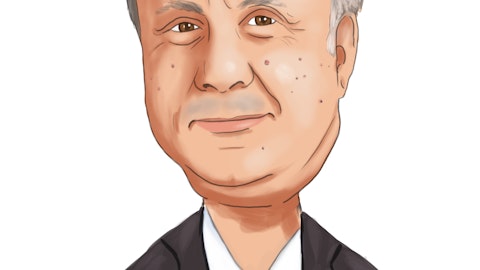Daniel Slaviero: Andre, this is a continuous work done by the company, to work and monitor not only with our internal team, but our external teams as well. Without a doubt, this civil lawsuit that is referring to 2015, so quite some time ago, without a doubt was the largest lawsuit of the company in the civil or labor courts, but here, we do very strong work in the management of the company’s legal liabilities. Unfortunately, we had to do this, but it’s a process, a lawsuit that is already close to a liquidation phase and we do not expect any additional factor, at least considering the information we have available today.
Operator: Next question, Leopoldo Crippa.
Leopoldo Crippa: Good morning. A provision of BRL453 million with the arbitration litigation, does it have any immediate cash effect? Thank you.
Daniel Slaviero: Excellent question, thank you, Leopoldo and the answer is no. It reflects our best estimate considering the stage where the arbitration lawsuit is, but there’s no cash effect at this time. We’ll continue to monitor and discuss this, so that it has the best possible outcome for the company. We know the relevance of this impact and to be able to mitigate it as much as possible to have the smallest cash effect possible over the coming months.
Operator: Next question, Pedro Marcuzi .
Unidentified Analyst: Good morning. I’d like to know about the dividend payment for this year of 2023. Thank you.
Daniel Slaviero: Well, Pedro. Good morning. Look, and as I emphasized in my presentation, of the BRL970 million for interest on equity last year approved at the shareholders meeting, BRL600 million were paid in November and the idea is to pay the balance of BRL370 million in June or by June, actually, and the specific date will be defined at the meeting in April. So the idea is to maintain these payments with the maximum payment of 2022.
Operator: Next question, Pedro Manfredini.
Pedro Manfredini: Good morning. To what extent the process to, transition process to corporation done by Eletrobras can be an example for COPEL, both to overcome legal and political barriers as an example of corporate moves and simplification of structure, et cetera? Thank you.
Daniel Slaviero: Good morning, Pedro. Actually, Eletrobras process is the major leading case. We’ve been seeking, looking at what happens there to make the necessary adjustments; of course, it’s a lot less complex. We don’t have Angra. We don’t have Itaipu. We don’t have the size Eletrobras has, but the backbone of what was done there is certainly a major reference for us to follow. And I think, this is one of the advantages that our process has, and that’s why it’s been a lot faster, a lot more agile when you compare to Eletrobras and others announced in the same path. The model of the structure that the controlling shareholder, the State of Paraná also looked at what happened and included something that we consider very positive and healthy, which is the golden share for investments in distribution, but all of them with practices and references from the market, especially the determinations of ANEEL.





